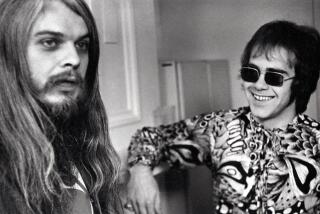Russell Lynes; Satirical Critic of U.S. Tastes
- Share via
Russell Lynes, a pre-eminent American cultural historian, primarily in the areas of architecture and art, is dead.
The former managing editor of Harper’s Magazine who probably was best known for his satirical “Highbrow, Middlebrow, Lowbrow,” in which Americans were told how to rate their family and friends for snob appeal or lack of it, was 80 when he died Saturday at a New York City hospital. He died of apparent heart failure.
Lynes’ observations on the fine and lively arts had amused America since he became Harper’s managing editor in 1947.
From then until shortly before his death, Lynes tweaked his fellow citizens for their devotion to iceberg lettuce drowned in French dressing, for placing plastic pink flamingos on green lawns flanked by great chunks of philodendron and for putting television sets in their dining rooms.
Such books as “The Tastemakers,” “Snobs,” “Guests” and “The Lively Audience” took to task U.S. households and their occupants for both their stuffed shirts and the hot dog mustard they dropped on them.
But “I’m not a critic,” Lynes told the New York Times in 1985. “The public thinks of a critic as someone who’s against everything and I’m not. I’m amused by a lot of things.” Even Park Avenue was a favored source of his wonder. “Why would anyone want to live on Park Avenue?” he once asked. “There’s nothing to look at except the buildings across the way.”
A native of Massachusetts, Lynes went to work as a clerk at Harper & Brothers, the publishing house, after graduating from Yale and worked a variety of college and preparatory school jobs until he joined Harper’s as an assistant editor.
He continued to write well past retirement from Harper’s in 1967. His last book, “Life in the Slow Lane: Observations on Art, Architecture, Manners and Other Such Spectator Sports” was published last spring.
Although Lynes became well known throughout the literary world, he eschewed fame for its own sake, saying the quickest way to achieve it was to “have an artificial heart put in you,” even though “chances are you’ll disappear quickly.”
More to Read
The biggest entertainment stories
Get our big stories about Hollywood, film, television, music, arts, culture and more right in your inbox as soon as they publish.
You may occasionally receive promotional content from the Los Angeles Times.









